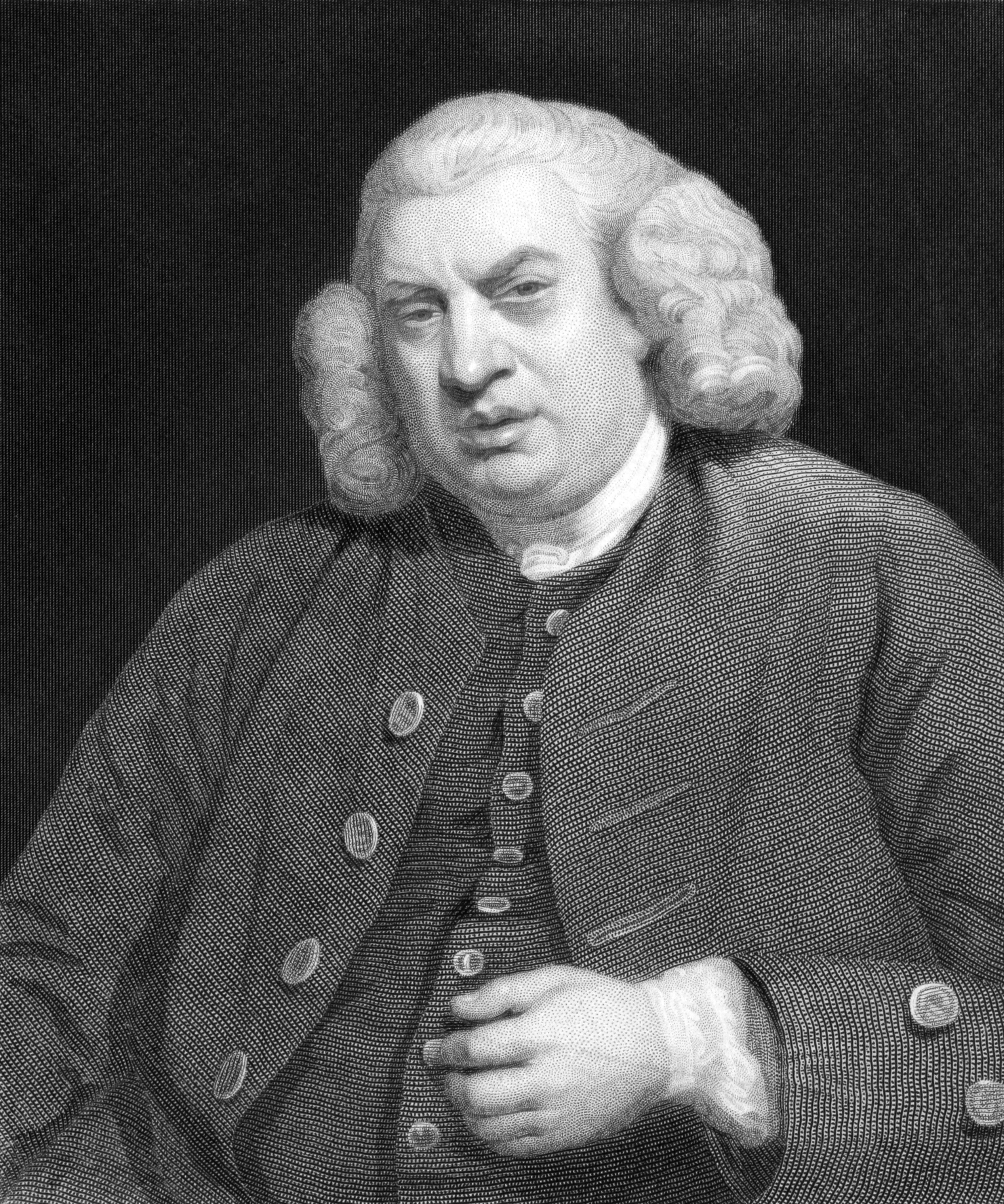Samuel Johnson frasi celebri
“Richardson aveva colto il nocciolo della vita… mentre Fielding si era accontentato del guscio.”
da Thraliana , a cura di Balderston, I, p. 555
riferendosi ai critici; citato in James Boswell, Vita di Samuel Johnson, 1754
citato in James Boswell, Vita di Samuel Johnson, 14 luglio 1763
“Ciò che è scritto senza sforzo è generalmente letto senza piacere.”
da Miscellanies
Johnson Miscellanies
Samuel Johnson Frasi e Citazioni
“Fielding è capace di descrivere un cavallo o un asino ma non ci è mai riuscito con un mulo.”
da Johnson Miscellanies, a cura di George Birkbeck Norman Hill, I, pp. 273-4
Origine: Citato in Ian Watt, Le origini del romanzo borghese (The Rise Of The Novel), traduzione di Luigi Del Grosso Destrieri, Bompiani, Milano, 1985.
“Le cifre tonde sono sempre false.”
citato in Apophthegms, Sentiments, Opinions and Occasional Reflections di Sir John Hawkins, in Johnsonian Miscellanies (1897), vol. II, pag. 2, edito da George Birkbeck Hill
Johnson Miscellanies
citato in James Boswell, Vita di Samuel Johnson, 30 aprile 1773
Origine: Citato in John Lukacs, Democrazia e populismo, traduzione di Giovanni Ferrara degli Uberti, Longanesi, 2006, p. 152.
citato in James Boswell, Vita di Samuel Johnson
Your manuscript is both good and original, but the part that is good is not original and the part that is original is not good.
[Citazione errata] Questa citazione viene spesso attribuita a Johnson ma non trova alcun riscontro nelle opere o nelle lettere dello scrittore, né tanto meno nelle biografie di Johnson scritte dai suoi contemporanei.
Attribuite
Origine: Samuel Johnson did not say: "Your manuscript is both good and original. But the part that is good is not original, and the part that is original is not good." http://www.samueljohnson.com/goodorig.html, Samuel Johnson.com.
“In quante poche case degli amici sceglierebbe di stare un uomo quando è ammalato!”
Origine: Citato in Boswell, Life of Johnson, IV.
Origine: Citato in Dizionario delle citazioni, a cura di Italo Sordi, BUR, 1992. ISBN 14603-X
“La natura ha dato alla donna un tale potere che la legge ha giustamente deciso di dargliene poco.”
Origine: Da Letters, I.
Origine: Citato in Dizionario delle citazioni, a cura di Italo Sordi, BUR, 1992. ISBN 14603-X
Samuel Johnson: Frasi in inglese
“I am glad that he thanks God for anything.”
1755
Bartlett's Familiar Quotations, 10th ed. (1919), Life of Johnson (Boswell)
“Sir, I have found you an argument; but I am not obliged to find you an understanding.”
June 1784, p. 545
Life of Samuel Johnson (1791), Vol IV
“But, scarce observ'd, the knowing and the bold
Fall in the gen'ral massacre of gold.”
Origine: Vanity of Human Wishes (1749), Line 21
“A man used to vicissitudes is not easily dejected.”
Origine: The History of Rasselas, Prince of Abissinia (1759), Chapter 12
“He is not only dull himself, but the cause of dullness in others.”
1784
Bartlett's Familiar Quotations, 10th ed. (1919), Life of Johnson (Boswell)
Chap. lxxii.
1778
Bartlett's Familiar Quotations, 10th ed. (1919), Life of Johnson (Boswell)
“All argument is against it; but all belief is for it.”
On the subject of ghosts, March 31, 1778, p. 373
Life of Samuel Johnson (1791), Vol III
“This world, where much is to be done and little to be known.”
Prayers and Meditations, Against Inquisitive and Perplexing Thoughts (1785)
May 1, 1783, p. 513
Life of Samuel Johnson (1791), Vol IV
1763
Bartlett's Familiar Quotations, 10th ed. (1919), Life of Johnson (Boswell)
A Dictionary of the English Language (1755)
1754
Life of Samuel Johnson (1791), Vol I
George Steevens, 310
Bartlett's Familiar Quotations, 10th ed. (1919), Johnsoniana
Origine: The History of Rasselas, Prince of Abissinia (1759), Chapter 3
March 21, 1776, p. 287
Life of Samuel Johnson (1791), Vol II
“LEXICOGRAPHER — A writer of dictionaries, a harmless drudge.”
A Dictionary of the English Language (1755)
Origine: The History of Rasselas, Prince of Abissinia (1759), Chapter 28
September 14, 1777, p. 341
Life of Samuel Johnson (1791), Vol III
July 31, 1763, p. 132. [Several editions have the variant "hind legs".]
Life of Samuel Johnson (1791), Vol I
Kearsley, 606
Bartlett's Familiar Quotations, 10th ed. (1919), Johnsoniana
London: A Poem (1738) http://andromeda.rutgers.edu/~jlynch/Texts/london2.html, lines 158–161
“An age that melts in unperceiv'd decay,
And glides in modest innocence away.”
Origine: Vanity of Human Wishes (1749), Line 293
A Journey to the Western Islands of Scotland (1775), Inch Kenneth
October 5, 1773
Recounted as a common saying of physicians at the time.
The Journal of a Tour to the Hebrides (1785)
“Officious, innocent, sincere,
Of every friendless name the friend.”
Stanza 2
Elegy on the Death of Mr. Robert Levet, A Practiser in Physic (1783)
No. 50 (8 September 1750); often misattributed to Joseph Addison
The Rambler (1750–1752)
1754, p. 72 (n. 4)
Referring to critics
Life of Samuel Johnson (1791), Vol I
